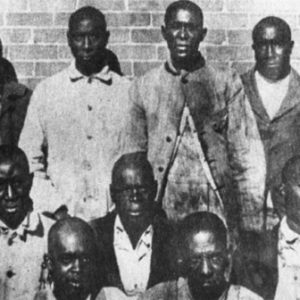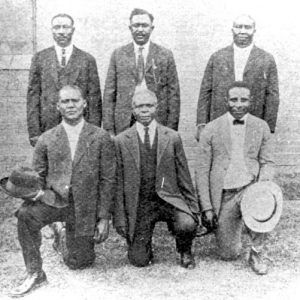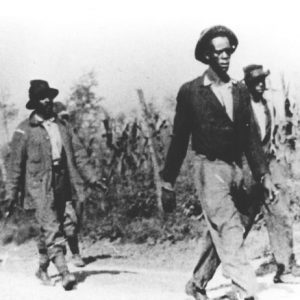calsfoundation@cals.org
Joseph (Joe) Fox (1897–?)
Joseph (Joe) Fox was one of twelve African-American men accused of murder following the Elaine Massacre of 1919. After brief trials, the so-called Elaine Twelve—six who became known as the Moore defendants and six (including Fox) who became known as the Ware defendants—were found guilty of murder and sentenced to death. Ultimately, the Ware defendants were freed by the Arkansas Supreme Court in 1923; after numerous legal efforts, the Moore defendants were released in 1925.
Joe Fox was born on October 8, 1897, in Louisiana to Sides Fox and Annie Fox. By the 1910 census, the twelve-year-old lived with his parents as an only child in East Carroll, Louisiana. He worked with his parents on the farm as a sharecropper. In Arkansas, he registered for a World War I draft card in 1918 while he farmed twenty acres of land owned by Howe Lumber Company in Phillips County. He produced twenty bales of cotton worth $225 per bale. However, Fox never received his payment and lost $4,500 in profit.
A 1916 federal study of plantation conditions in Arkansas warned that there was acute unrest due to the tenant farming system and oppressive landlords, and that this could lead to organized resistance. The Progressive Farmers and Household Union of America (PFHUA) held a meeting on September 30, 1919, in a rural church outside of Elaine (Phillips County). Fox and a group of sharecroppers attended the meeting to discuss the cruel treatment of white landowners and reclaim the money that was owed to them. Alfred Banks and John Martin were placed as armed guards outside the church for protection. An exchange of gunfire erupted, and W. A. Adkins, employed as a security officer for the Missouri Pacific Railroad, was killed, and Charles Pratt, a Phillips County deputy sheriff, was wounded; both were white. The shooting escalated into mob violence against the area’s black citizens, and although the exact number is unknown, estimates of the number of African-American men, women, and children killed by whites range into the hundreds; five white people died.
Following the violence, 122 African Americans were charged with crimes ranging from murder to “nightriding” and placed on trial beginning November 3. On November 4, 1919, Joseph Fox and Albert Giles were put on trial for the murder of white posse member James Tappen. In a joint statement, Fox and Giles claimed that they were not present at the church that night. In only six minutes, the all-white jury convicted both of murder with the judge sentencing them to death by electrocution. Eventually, twelve total would be sentenced to death. The men were incarcerated at the Arkansas State Penitentiary in Little Rock (Pulaski County).
Their cases drew the attention of the National Association for the Advancement of Colored People (NAACP), and civil rights lawyer Scipio A. Jones came to the defense of Fox and the other eleven defendants who had been sentenced to death. In December 1919, the men were granted a stay of execution by Governor Charles Brough, allowing for appeal. In March 1920, Fox’s death sentence, along with those of the five other Ware defendants (Ed Ware, William Wordlaw, Albert Giles, Alfred Banks, and John Martin), was reversed by the Arkansas Supreme Court, and they were sent back to Helena (Phillips County) for a new trial based on a technicality. A May 1920 retrial in Helena upheld the convictions. In December 1920, the Arkansas Supreme Court reversed the decision from Helena and called for a new trial. An April 1923 petition demanded the release of the prisoners due to the lack of trials for the last two court sessions, and on appeal, the Arkansas Supreme Court agreed, releasing Fox and the five others. The other six members of the Elaine Twelve, the Moore defendants, were released in 1925.
Nothing else has been found on Fox dated after his 1923 release.
For additional information:
Cortner, Richard C. A Mob Intent on Death: The NAACP and the Arkansas Riot Cases. Middletown, CT: Wesleyan University Press, 1988.
Lancaster, Guy, ed. The Elaine Massacre and Arkansas: A Century of Atrocity and Resistance, 1819–1919. Little Rock: Butler Center Books, 2018.
Stockley, Grif, Brian K. Mitchell, and Guy Lancaster. Blood in Their Eyes: The Elaine Massacre of 1919. Rev. ed. Fayetteville: University of Arkansas Press, 2020.
Wells, Ida B. “The Arkansas Race Riot.” Chicago: 1920. https://archive.org/details/TheArkansasRaceRiot/ (accessed May 7, 2019).
Whayne, Jeannie M. “Low Villains and Wickedness in High Places: Race and Class in the Elaine Riots.” Arkansas Historical Quarterly 58 (Autumn 1999): 285–313.
Whitaker, Robert. On the Laps of Gods: The Red Summer of 1919 and the Struggle for Justice that Remade a Nation. New York: Crown, 2008.
Brian K. Mitchell, Kary Goetz, Jessica Chavez
University of Arkansas Little Rock









Comments
No comments on this entry yet.